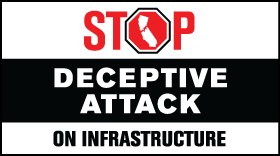 The California Chamber of Commerce is leading a coalition to stop a November 2016 ballot measure that threatens to significantly disrupt infrastructure development, jobs and the economy in California. (8/11/16 update: The measure will appear on the ballot as Proposition 53.)
The California Chamber of Commerce is leading a coalition to stop a November 2016 ballot measure that threatens to significantly disrupt infrastructure development, jobs and the economy in California. (8/11/16 update: The measure will appear on the ballot as Proposition 53.)
The Secretary of State announced on Monday that supporters of the initiative, including the proponent, Stockton-area farmer and food processor Dean Cortopassi, had submitted enough signatures to qualify the measure for the ballot.
The measure amends the state Constitution to require statewide voter approval for revenue bonds used to build California infrastructure projects exceeding $2 billion.
The growing coalition, Citizens to Protect California Infrastructure, includes labor, business, water, family farmers, environmentalists and other organizations that have come together to defeat the Cortopassi initiative.
Hurts Infrastructure Projects
“This ballot measure is both deceptive and dangerous,” said CalChamber President and CEO Allan Zaremberg, co-chair of the committee formed to defeat the measure.
“It’s deceptive because revenue bonds are not repaid by taxpayers; they’re repaid by users of a project. Since neither the general fund nor state taxpayers are on the hook for repayment, it’s misleading and unnecessary to call for a statewide vote.
“The measure is dangerous because it would stall or stop vitally needed infrastructure projects all over the state, including water reliability projects, road safety and bridge repairs, universities and college buildings, and other infrastructure. And the measure’s provisions would be locked into our state Constitution with no exceptions to respond to natural disasters or emergencies.”
Key Problems
Among key problems with the initiative identified by the coalition:
• Deceptive. Cortopassi has supplied the entirety of $4 million to put this measure on the ballot. He opposes the plan to repair California’s statewide water distribution infrastructure through the Delta. Irrespective of one’s position on that single project, this measure locks into the Constitution this requirement that would block much-needed repairs of roads, bridges, water supply and delivery systems, and universities all over the state.
• Unnecessary. Private investors bear the financial risk for revenue bonds, not the state or its general fund. Revenue bonds are repaid by users of a project who directly benefit, not taxpayers. For instance, repairs to a bridge would be paid by tolls on the bridge, or customers in a specific water district would pay to build a water recycling plant, not taxpayers. It makes no sense to have a statewide election on projects not financed by taxpayers for which the state and local governments bear none of the financial risk.
• Erodes local control. This measure takes away local control by requiring statewide voter approval even for local projects. Under this measure, cities and towns that want to come together with the state and form a joint powers authority to issue revenue bonds to upgrade local water systems, roads, bridges and universities would have to put their project on a statewide ballot. That means voters in faraway regions would have the authority to deny funding for local projects outside of their community.
• Disrupts vital infrastructure development. California and its local communities already suffer from a massive backlog of essential infrastructure needs, including outdated water systems that cannot withstand earthquakes, crumbling roads and bridges, and over-crowded hospitals and universities. This measure would make our infrastructure problems worse by denying the use of privately funded revenue bonds to finance these much-needed projects.
• Jeopardizes our ability to fix infrastructure after a natural disaster. The ballot measure’s provisions would be locked into our state Constitution, and contain no exemptions for emergencies, or a major natural disaster like an earthquake. That means state and local governments must wait as long as two years in order to get voter approval to begin rebuilding damaged or destroyed roads, freeways, bridges, hospitals and water delivery systems after an emergency.
• Added costs, bureaucracy and delays. This measure will drive up the costs of building vital projects by forcing state and local governments to use more expensive forms of financing. It would also create more red tape and bureaucracy that make projects like water systems, roads, bridges and universities more expensive and difficult to complete.

